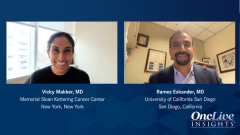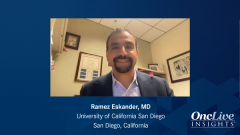
Molecular Testing in Endometrial Cancer
Experts discuss how molecular testing can inform treatment selection and patient management for those with endometrial cancer.
Episodes in this series

Transcript:
Ramez Eskander, MD: How are you guys incorporating molecular testing in your treatment of endometrial cancer patients? I know you guys have the MSK-IMPACT [integrated mutation profiling of actionable cancer targets] platform. Are you doing it for all patients at diagnosis? Are you doing it only for patients with metastatic disease? And how did you guys come up with a platform to use in this setting?
Vicky Makker, MD: I think that the 2013 TCGA [The Cancer Genome Atlas] endeavor really got everybody hypermotivated to try to understand how to incorporate this type of testing in this extraordinarily heterogeneous disease. Here at our center now, pathologic evaluation and biomarker molecular testing of endometrial cancer is performed on all patients that come to MSKCC [Memorial Sloan Kettering Cancer Center]. So it’s at time of presentation to our center whether that’s when they’re coming for their upfront surgery or whether they’re coming for recurrent metastatic disease management. Essentially all patients will undergo IHC [immunohistochemistry] testing for the routine things. MMR [mismatch repair] proteins—if there’s loss of MLH1 or PMS2, we’ll do the reflexive hypermethylation testing. We also perform HER2 testing on the appropriate subpopulations of the serous, serous like, or carcinosarcoma patients. ER/PR [estrogen receptor/progesterone receptor] testing on the appropriate patients, and then yes, we do perform the germline somatic molecular profiling via next-generation sequencing [NGS] using our MSK-IMPACT assay. This will give us information also about the POLE status and the tumor mutational burden status as well. And this approach is employed at our institution university for endometrial cancer patients. What are your methods to approach testing for these patients?
Ramez Eskander, MD: Very similar. We have an in-house assay that we can use but we do a lot of it right now and our practice hinges on what we do through pathology on initial assessment of the tissue specimen. So the same with the mismatch repair IHC, HER2 in appropriately selected patients. Some of the work by Britt Erickson [MD] suggested even carcinosarcomas or clear cells can be HER2 amplified and even some grade 3. What we struggle with is sometimes it’s hard to understand which histologies are we really going to focus on especially now that we’re learning that there can be P53 aberrations in some grade 3. It’s not just in the serous or serous-like tumors. So it’s as if I feel like we’re moving a bit more towards just testing our patients in total although we understand that for low-grade early-stage disease, it’s unlikely that the information that are going to be gathered are going to impact treatment counseling or recommendations. But exactly the same mismatch repair IHC, reflex promoter hypermethylation when appropriate, HER2, ER/PR. We don’t have the ability to assess for a POLE hot spot mutation, so if we are really looking for POLE, it would have to be a send out for an NGS platform. The good thing is that for many patients, both MSI [microsatellite instability] assessment by PCR [polymerase chain reaction] and mismatch repair IHC are both covered and justified because of the approvals that we have. So you can send out an NGS assessment to explore the MSI by PCR but also get the dMMR [deficient mismatch repair] status based on your institutional IHC assay. So thankfully, we have the opportunity to incorporate both strategies.
Vicky Makker, MD: I think what’s clear here is the more you can learn about the molecular phenotype of your patients the better it is and you’re armed with that information and it will inform and potentially impact therapy. So I wholeheartedly agree with everything that you’ve said.
Transcript edited for clarity.









































